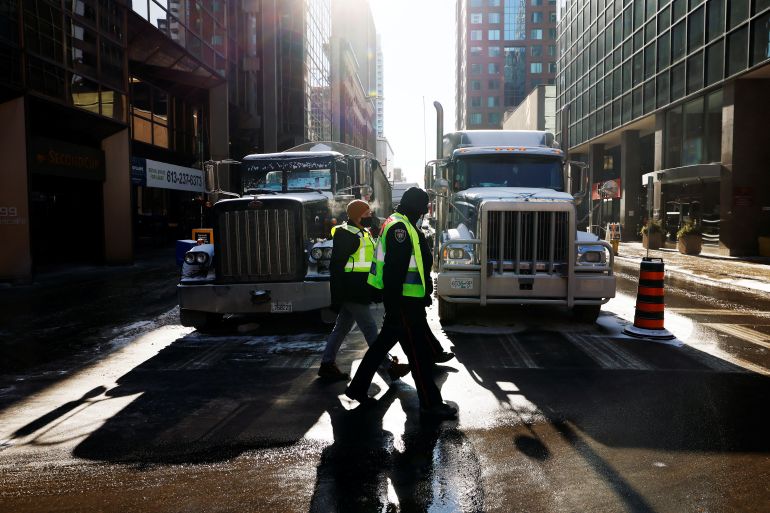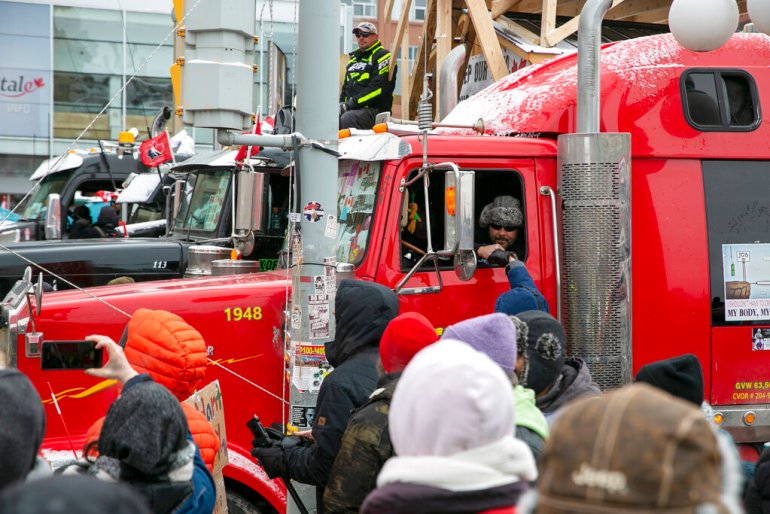Canada’s Emergencies Act: What power does it give Justin Trudeau?
Prime Minister Justin Trudeau invoked never-before-used measures in response to anti-government trucker protests and blockades.

After weeks of anti-government protests in the Canadian capital and blockades at key border crossings with the United States, Canada’s Prime Minister Justin Trudeau invoked a never-before-used emergency power to respond to the situation.
“The federal government has invoked the Emergencies Act to supplement provincial and territorial capacity to address the blockades and occupations,” Trudeau told reporters on Parliament Hill on Monday afternoon.
Keep reading
list of 3 itemsWhat’s fuelling Canada’s trucker protest?
Photos: Canadian truckers protest against COVID measures
“I want to be very clear: the scope of these measures will be time-limited, geographically-targeted, as well as reasonable and proportionate to the threats they are meant to address.”
The move came after more than two weeks of so-called “Freedom Convoy” protests by Canadian truckers and their supporters, who are demanding an end to all coronavirus restrictions. Participants of the movement, organised by far-right activists, set up border blockades and occupied a residential area in downtown Ottawa, where some have harassed and threatened residents.
Here, Al Jazeera explains how the Emergencies Act works, what response Trudeau’s announcement has garnered, and what comes next.
What is the Emergencies Act?
The Emergencies Act, which came into force in 1988, allows the federal government to take “special temporary measures to ensure safety and security during national emergencies”. It is a temporary, 30-day measure that comes into effect immediately when invoked. But the Act must get approval within seven days from Canada’s Parliament.
What constitutes a national emergency?
The Act defines a national emergency as “an urgent and critical situation of a temporary nature” that:
- “seriously endangers the lives, health or safety of Canadians and is of such proportions or nature as to exceed the capacity or authority of a province to deal with it”, or
- “seriously threatens the ability of the Government of Canada to preserve the sovereignty, security and territorial integrity of Canada”
The emergency also “cannot be effectively dealt with under any other law of Canada”.
The Act outlines four different types of national emergencies: a war emergency, an international emergency, a public welfare emergency and a public order emergency. In this case, the government is invoking a public order emergency.
What powers does this grant the government?
Under the Emergencies Act, the government can use a range of additional powers, including the regulation or prohibition of:
- any public assembly “that may reasonably be expected to lead to a breach of the peace”
- travel to, from or within a specific area
- use of specific property
An Order in Council issued on Tuesday, which explains why the government believes the trucker blockades constitute a national emergency, also says potential measures can include the designation of protected places; the direction of any person to render essential services; the use of federal Royal Canadian Mounted Police (RCMP) to enforce municipal and provincial laws, and the imprisonment of, or imposition of fines on, people breaching the order.
Does the government need to show a public order emergency exists?
It must make its case in Parliament. The Act specifies that a public order emergency “means an emergency that arises from threats to the security of Canada and that is so serious as to be a national emergency”.
What constitutes a ‘threat to the security of Canada’?
That is set out in the Canadian Security Intelligence Service Act (CSISA) as one of four possible things:
- espionage or sabotage that is against Canada or is detrimental to the interests of Canada or activities directed towards or in support of such espionage or sabotage;
- foreign-influenced activities within or relating to Canada that are detrimental to the interests of Canada and are clandestine or deceptive or involve a threat to any person;
- activities within or relating to Canada directed towards or in support of the threat or use of acts of serious violence against people or property for the purpose of achieving a political, religious or ideological objective within Canada or a foreign state, and
- activities directed towards undermining by covert unlawful acts, or directed towards or intended ultimately to lead to the destruction or overthrow by violence of, the constitutionally established system of government in Canada
Threats to the security of Canada “does not include lawful advocacy, protest or dissent, unless carried on in conjunction with any of the activities” above, the Act states.
In the Order in Council outlining its decision, the government argues that the trucker blockades are being carried out “in conjunction with activities that are directed toward or in support of the threat or use of acts of serious violence against persons or property, including critical infrastructure, for the purpose of achieving a political or ideological objective within Canada”.

Has this ever been used before?
This is the first time the Emergencies Act has been used since it replaced the War Measures Act in 1988. Trudeau’s father, then-Prime Minister Pierre Trudeau, invoked the War Measures Act in 1970 in response to a wave of violence by hardline Quebec separatists. The period was known as the October Crisis.
How do the Emergencies Act and War Measures Act differ?
The War Measures Act was widely criticised as an infringement of civil liberties; during the October Crisis, the military was deployed in Quebec and about 400 people were arrested under the measure.
The Emergencies Act must be applied in line with the Charter of Rights and Freedoms, which sets out constitutionally protected rights in Canada. The Act also establishes a parliamentary committee to provide oversight and requires an inquiry to be held after the extraordinary measures are lifted to investigate “the circumstances that led to the declaration being issued and the measures taken for dealing with the emergency”.
Alex Neve, a senior fellow at the Graduate School of Public and International Affairs at the University of Ottawa, said “there was a real focus on oversight and accountability” when the Emergencies Act was overhauled and adopted in 1988.
“There’s a lot that’s going to give some transparency,” Neve told Al Jazeera, stressing that it is incumbent on all Canadians – from media to opposition politicians, legal experts and civil society and rights groups – “to watch that very carefully and to speak out and take action if it seems that there are any abuses happening”.
“The Act does not get to sidestep the Charter of Rights [and Freedoms] and that’s very important, and I think it was reassuring to hear from the prime minister and ministers [on Monday, and their] frequent references to that,” he said.
So has Canada met the threshold needed to declare an emergency in this case?
That remains unclear – and the government is expected to make its case.
The Canadian Civil Liberties Association said on Monday that the government had not met the threshold, warning that emergency legislation such as the Emergencies Act “should not be normalized”.
Leah West, assistant professor of international affairs at Carleton University in Ottawa, told CBC News on Monday that the government had yet to provide information publicly to show that the public order emergency threshold has been met.
Commenting on the Order in Council, West tweeted on Tuesday that the government is arguing “that the threat of terrorism linked to the ongoing blockades is so seriously threatening to Canada’s economic security that it rises to the level of a national emergency”.
“I hope the [government] will present what they can to Parliament/[Canadians] when they debate the matter in the coming days,” she wrote.
I hope the Gov will present what they can to Parliament/Cdns when they debate the matter in the coming days. Ultimately this will be something for those tasked with the Inquiry after the fact (mandated by the Act) to review and confirm.
— Leah West (@leahwest_nsl) February 15, 2022
What comes next?
The Canadian government must go to Parliament to get approval to use the Emergencies Act.
Canadian lawmakers were debating the issue in the House of Commons on Tuesday afternoon. If the House of Commons or the Senate does not agree with the decision to invoke the Act, the order will be rescinded.
Jagmeet Singh, leader of the left-leaning New Democratic Party (NDP), said on Monday that he would support the move “given how serious the crisis is” – which CBC News reported would mean it will pass in the House.
Neve told Al Jazeera that the question of whether invoking the Emergencies Act was necessary is on many people’s minds right now, “and would absolutely have to be one of the central considerations examined” in the inquiry that is held when the emergency order is lifted.
“The Emergencies Act itself specifies that it is only supposed to be invoked if the situation cannot be handled through existing law and measures,” he said, adding that many have argued the problem is not that existing laws do not apply in these circumstances, but that authorities have shown “a baffling inability or unwillingness – or both – to enforce that law”.